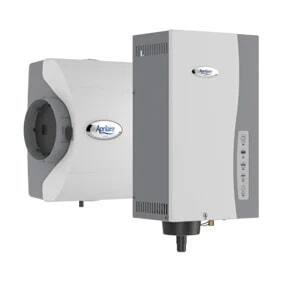Winter brings chilly weather, cozy indoor activities, and—unfortunately—dry indoor air. As we rely on heating systems to keep warm, they often reduce indoor humidity levels, leaving the air in our homes dry. Dry air can be more than just uncomfortable; it can actually impact our health. Adding a humidifier to your home can help keep you comfortable and reduce common winter health issues. Let’s explore why using a humidifier this winter might be one of the best steps you can take for your health.
Types of Humidifiers
 Portable humidifiers
Portable humidifiers
Portable humidifiers are compact, stand-alone units designed to humidify single rooms or small spaces. They’re easy to set up, affordable, and ideal for bedrooms, offices, or specific areas where you need extra moisture. However, they need regular refilling and frequent cleaning to prevent mold and bacteria buildup, which makes them slightly higher maintenance. Portable units are versatile and can be moved from room to room, offering flexibility but generally not the capacity to cover an entire home.

Whole-home humidifiers
Whole-home humidifiers, such as those from Aprilaire, are integrated directly into your HVAC system to distribute moisture evenly throughout the entire house. These systems are more efficient for maintaining balanced humidity levels across multiple rooms and are lower maintenance, typically only needing seasonal cleaning. They also offer automated control, adjusting moisture levels based on indoor conditions, which is convenient for families and homeowners looking for a “set-it-and-forget-it” solution. Although they require an upfront investment, whole-home humidifiers are an excellent option for long-term comfort and health benefits throughout the year.
7 Benefits of Purchasing a Humidifier This Winter
1. Relieve dry skin and irritated eyes
One of the first things you may notice when the air gets too dry is how it affects your skin and eyes. Low humidity levels pull moisture from your skin, leading to dryness, itching, and cracking. A humidifier can help maintain a more comfortable humidity level, keeping your skin hydrated. This moisture in the air also reduces eye irritation, especially for contact lens wearers who are prone to dry eyes in winter.
Quick Tip: Keep a whole-home humidifier in rooms where you spend the most time, like your bedroom, to wake up without that uncomfortable “tight skin” feeling.
2. Soothe sore throats and ease breathing
Dry air can irritate the mucous membranes in your throat and sinuses, leading to soreness, scratchiness, and congestion. With a humidifier, the added moisture helps to soothe your throat and sinuses, making it easier to breathe, particularly if you have respiratory conditions like asthma or allergies. People with wintertime sore throats often find relief with a properly humidified environment.
Pro Tip: For bedrooms, consider using an ultrasonic humidifier; it’s quiet and ideal for overnight use, helping you breathe easier while you sleep.
3. Reduce the spread of airborne viruses
Did you know that the flu and other viruses spread more easily in dry air? Studies have shown that viruses survive longer in low-humidity environments, increasing the risk of infections. A humidifier can help you maintain an ideal humidity level of 30-50%, making it more difficult for viruses to survive and circulate in your home. This can be particularly beneficial for families with young children or individuals with compromised immune systems.
4. Alleviate allergies and asthma symptoms
For people with allergies or asthma, dry air can be a major trigger, worsening symptoms like coughing, sneezing, and nasal congestion. A humidifier helps by keeping the airways moist, reducing inflammation and irritation, and making it easier to expel allergens. However, it’s essential to keep the humidifier clean, as a dirty unit can spread mold or bacteria, which could worsen respiratory symptoms.
Maintenance Tip: Clean your humidifier weekly to prevent mold or bacteria buildup and replace filters regularly if your model requires them.
5. Protect your vocal cords
If you frequently experience a scratchy or hoarse voice in winter, dry air could be the culprit. Your vocal cords need moisture to vibrate properly, and low humidity levels can dry them out, causing discomfort and even temporary voice loss. A humidifier helps to keep the air moist, which, in turn, protects your vocal cords and keeps your voice clear and strong.
Fun Fact: This is why many singers and speakers use humidifiers in their homes—proper hydration keeps their voices in top shape year-round!
6. Keep your nasal passages moist
When indoor air is dry, your nasal passages can lose moisture, leading to dryness, irritation, and an increased likelihood of nosebleeds. This can be especially troublesome in winter, when heaters exacerbate dry air conditions. A humidifier maintains balanced humidity in the air, helping to prevent nasal dryness and reduce the risk of nosebleeds, making winter a little more bearable.
7. Better sleep quality
A humidifier can also improve your sleep quality by alleviating dry throat and nasal congestion, allowing for easier breathing throughout the night. You’re less likely to wake up due to a dry mouth or throat, helping you rest more soundly and wake up refreshed.
Quick Sleep Tip: Place a humidifier in the bedroom, ideally near the bed, to enjoy direct benefits during sleep. Many models come with a sleep mode, keeping noise levels low for restful nights.
Conclusion
Winter doesn’t have to mean dealing with dry skin, sore throats, and uncomfortable respiratory symptoms. Investing in a humidifier can transform your indoor environment, providing you and your family with a range of health benefits. From improved skin hydration to reduced spread of viruses, a humidifier is a small investment that can make a big difference in your well-being this winter.
If you live in the Delaware Valley/Greater Philadelphia area and would like to find comfort within your home, visit our website or give us a call at 215 - 245 - 3200 to learn more.




